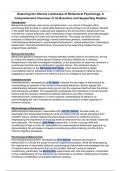Essay
Exploring the Diverse Landscape of Behavioral Psychology: A Comprehensive Overview of its Branches and Supporting Studies
- Module
- Introduction To Psychology
- Institution
- Birmingham City University (BCU)
~1000 word essay on behavioural psychology, its branches, and key studies
[Show more]




